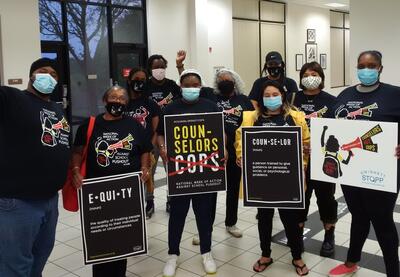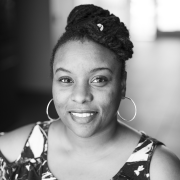When community activists created the grassroots organization Gwinnett Parent Coalition to Dismantle the School to Prison Pipeline (Gwinnett SToPP) in 2008, their mission was clear, and their name spelled it out. Since then, they’ve been busy trying to overhaul their school district’s punitive discipline policies and remove police from their schools.
The reality of the school-to-prison pipeline in Gwinnett County, Georgia, couldn’t be more tangible than the structures on and near a high school campus there. The Office of Student Discipline and Behavioral Interventions—where school officials conduct discipline hearings similar to court cases—is housed right on the campus of Gwinnett InterVention Education Center-East (GIVE East). GIVE East is an alternative school for middle and high school students who, through a tribunal process, have been forbidden from returning to their assigned community school. A Gwinnett County Police Annex and the county jail stand across the street. And the district reportedly spends more than $10 million on school resource officers.
When students are literally surrounded by the trappings of the penal system, it normalizes that system and its patterns.
For many years, Gwinnett County Public Schools has received criticism and complaints about its discriminatory discipline policies. Several of its disciplinary decisions have been overturned in Georgia courts. Just within this last year, four of the district’s exclusionary discipline decisions have been overturned after being challenged by the Southern Poverty Law Center. Parents have been pushing to stem this trajectory before it starts.
Working Toward Police-free Schools
Tackling the issue of police presence at school had always been a concern for Gwinnett SToPP, but they were more focused on school discipline policies. Like other grassroots organizations, the 2020 Uprisings following the police killing of George Floyd moved the school police issue to the forefront.
“The whole police at schools campaign has been running for about seven years now,” says Marlyn Tillman, executive director and co-founder of Gwinnett SToPP. “We only came out publicly with it last summer because of the events that were going on. And it was a great time to then launch it publicly.”
Gwinnett County Public Schools is the largest school system in Georgia, serving more than 179,000 students. Over the last two decades, that county’s demographics have diversified, as white residents have moved out and people of color have moved in. Black students comprise 32% of the student population. Yet, according to the state’s most recent discipline statistics—select “Gwinnett County” in the school district dropdown and “Race/Ethnicity” for the subgroup—48% of all disciplinary action was handed down to Black students during the 2020-2021 school year, compared to only 11% levied against white students, who comprised 20% of the student body. The statistics show Hispanic students had a smaller population-to-discipline gap. They comprise 33% of the student body and received 34% of disciplinary actions last year.
While the demographics were changing, discriminatory practices were not. If anything, Tillman says, it got worse.
“As the county browned, the police force grew,” she says.
At the end of the day ... there’s no reason for us to be spending $10.4 million on police in schools.
— Marlyn Tillman
Tillman asserts that police have not served students well at Gwinnett County Public Schools, citing an armed force that too easily escalates conduct issues to entry into the criminal justice system.
“They’re often called to break up fights,” she says. “Their idea of breaking up a fight, however, is arresting students who were involved in a fight. Fighting is the number one disciplinary infraction that students are arrested for in Gwinnett County.”
In 2009, Gwinnett SToPP activists demanded that administrators denote in the student/parent handbook violations that could result in a referral to a school resource officer and possible criminal charges. That small change made a powerful impact.
“We managed to reduce by 33% the number of infractions that the school could even call the police on,” Tillman says. “That was huge, but understand that was all part of what we have to do to get them out. We got to improve this. … Because at the end of the day, the whole goal was, if we get them down to minimizing their function or policing, there’s no reason for us to be spending $10.4 million on police in schools.”
The group continues to push the district to adopt a policy that changes how they respond to school fights. And they are advocating for other solutions at all schools to reduce harm caused by punitive policies and get to the root of misbehavior by implementing restorative justice programs.
“They do that in one of the schools, but it’s only happening at one grade level,” Tillman says, “so we’re looking at having them do that more from a system-wide perspective.”

Learn more about Gwinnett SToPP and other community-based, multigenerational efforts to reapproach school safety in “Envisioning School Safety Without Police” from the Fall 2021 issue of Learning for Justice magazine.
A Mighty Few
Gwinnett SToPP includes a core group of about 10 to 15 parents, with a larger network who will join in for various issues. It only takes a few people with a common goal to spur change. With Tillman’s leadership, Gwinnett SToPP organizers help other parents raise their concerns and act on them. But mobilizing parents and students has been a challenge over the years.
“Students are operating from the position of fear, which our parents do, too,” Tillman says. She believes parents worry that, if their children “say too much,” the students will face retaliation.
But Tillman quipped, “They’re already coming after your child, so what’s the difference right now?”
For example, when Black students intended to wear all-black clothing to protest a racist incident in 2016, Tillman says the principal announced at school that they’d be suspended if they participated in the protest. Some students wanted to back off. But a parent of one of those students reached out to a friend of Tillman, who immediately contacted her. She contacted the legal director at the ACLU of Georgia and organized the parents and students—setting off a chain of events that included this coordinated group contacting the superintendent and expressing their concerns to the principal.
“What they didn’t know was going on in the background was I went and marshaled up some attorneys, and they went and marshaled up others who would represent any students who were disciplined for participating,” Tillman recalls. “One of the attorneys went off and wrote a letter and started the engagement back and forth with the school system’s attorney.”
The students protested without being disciplined. In fact, students and staff from across the district also participated in the protest.
Gwinnett SToPP has many wins. An important one is that, earlier this year, they served on a committee that reviewed the school’s discipline code. They are making their concerns known in the district in a clear, organized way.
More recently, Gwinnett SToPP has worked with advocates and attorneys to ensure no student goes through the disciplinary hearing process without representation. And, in collaboration with other community organizations, they influenced the school board to cancel the contract of the district’s long-time superintendent, who they claim hardened the school in his 25-year tenure and reinforced discriminatory discipline practices.
Looking Ahead
As Gwinnett SToPP strives for a police-free school district, they’ll continue educating community members and helping them tap their power. They host regular education workshops that outline issues with the education system, the district’s conduct policies and systemic racism. The group joined forces with the Dignity in Schools Campaign, a national coalition dedicated to dismantling the school-to-prison pipeline. They also work with the Georgia Council on Developmental Disabilities to focus on Black boys with disabilities and mitigate their entry into the school-to-prison pipeline.
They’ve been building relationships with school officials and juvenile court officials and aim to develop better relationships with Georgia legislators. In addition, they vow to hold the school board and the newly named superintendent accountable.
The work, Tillman says, is all about the safety and well-being of all students. It should not be acceptable for educators to rely on police to punish students who don’t conform or don’t fit nicely inside a boundary. And they shouldn’t hand down severe punishment to students who violate those arbitrary boundaries, such as talking back or being perceived as showing disrespect.
Tillman suggests to educators that they appreciate the different perspectives and gifts of all students.
“That child may have a very, very different view of the world,” she says. “And it may be a very different, beautiful view of the world.”

